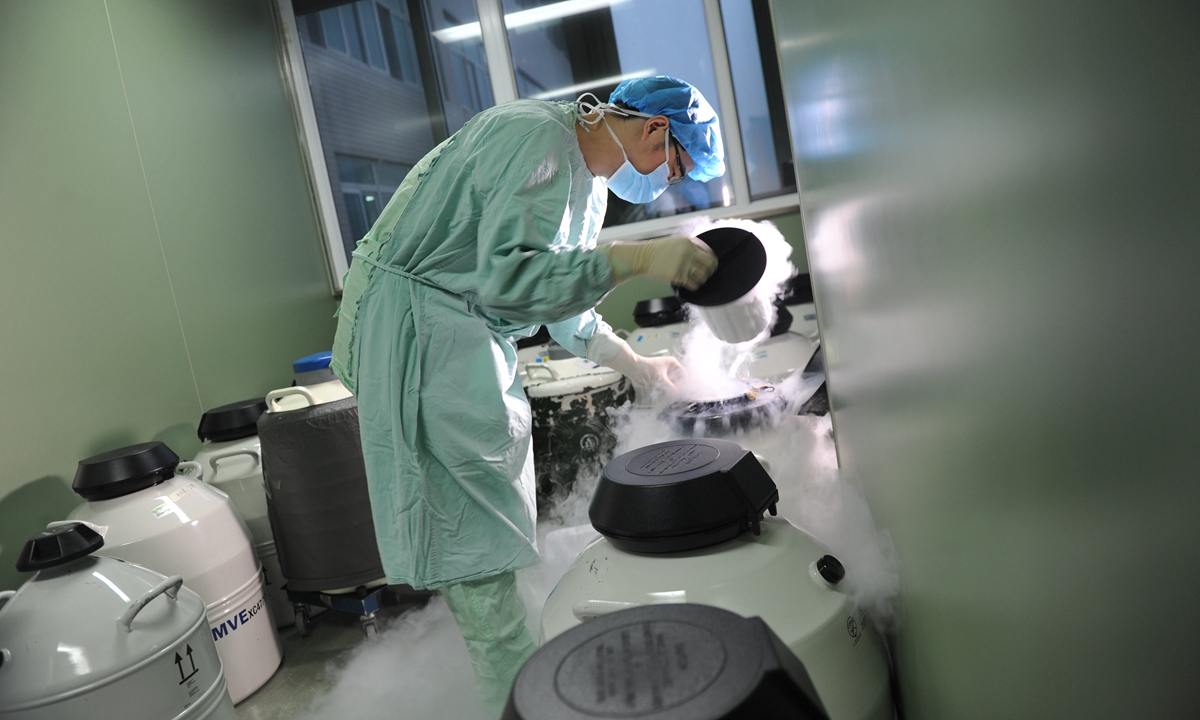China can explore feasibility of egg freezing for single women at appropriate time: political advisor

The Reproductive Medicine Center of The West China Second University Hospital of Sichuan University is the largest “test-tube baby” center in Southwest China. Photo: VCG
A member of the National Committee of the Chinese People's Political Consultative Conference (CPPCC) has suggested exploring the feasibility of egg freezing for single women in China to further promote a fertility-friendly society, as more and more political advisors consider measures to support childbearing women.
The development of China's population is facing profound and complex changes. Negative population growth is leading to a low birth rate and an aging population, which is the most significant risk affecting the balanced development of the population in China, Zhao Changlong, a member of the CPPCC, the country's top political consultative body, told the Global Times. In order to encourage childbirth, it is necessary to improve the supporting policies for childbirth and create a fertility-friendly social environment, with a crucial aspect being healthcare services, he said.
Zhao said that the current childbirth insurance system is not adapted to the economic and social development of China and the country's macro population policies, resulting in different social groups receiving inconsistent childbirth benefits, a problem that may worsen in the future.
Furthermore, China's development of assisted reproductive technology lags behind, leading to a supply-demand imbalance and high prices, he said. In recent years, the demand for assisted reproductive services has been continuously increasing, but the supply cannot meet the demand. Driven by huge profits, various non-public assisted reproductive institutions have grown rapidly, with varying service levels and uneven development between different regions.
Additionally, the supply of painless childbirth services is far from meeting the demand, and in most areas of the country, they have not been included in medical insurance. The rate of painless childbirth in China has increased from less than 10 percent in 2018 to the current 30 percent, but there is still a significant gap from the 80 percent rate in developed countries.
At the same time, the demand for egg freezing technology among single women is increasing, but the related issues of technology, law and ethics have not been resolved, he told the Global Times.
In response to the existing problems in the social childbirth environment, Zhao suggested improving the childbirth insurance system, enhancing the level of medical and health services, promoting painless childbirth services, and improving the assisted reproductive technology service system, according to his proposal for the two sessions that he shared with the Global Times.
Zhao also suggested exploring the feasibility of egg freezing for single women at an appropriate time, as science and technology progress, overall social morality improves, and legal systems develop.
China's population decreased by 2.08 million people in 2023 to 1.40967 billion, according to data released by the National Bureau of Statistics (NBS) on January 17. In 2023, 9.02 million babies were born, resulting in a birth rate of 6.39 per thousand people. Meanwhile, 11.1 million people died in 2023, equal to a death rate of 7.87 per thousand people, the data showed.
According to the National Health Commission, the intention of women of childbearing age to have children continues to decline, with the average for the number of children women want to have falling from 1.73 in 2019 to 1.64 in 2021.
